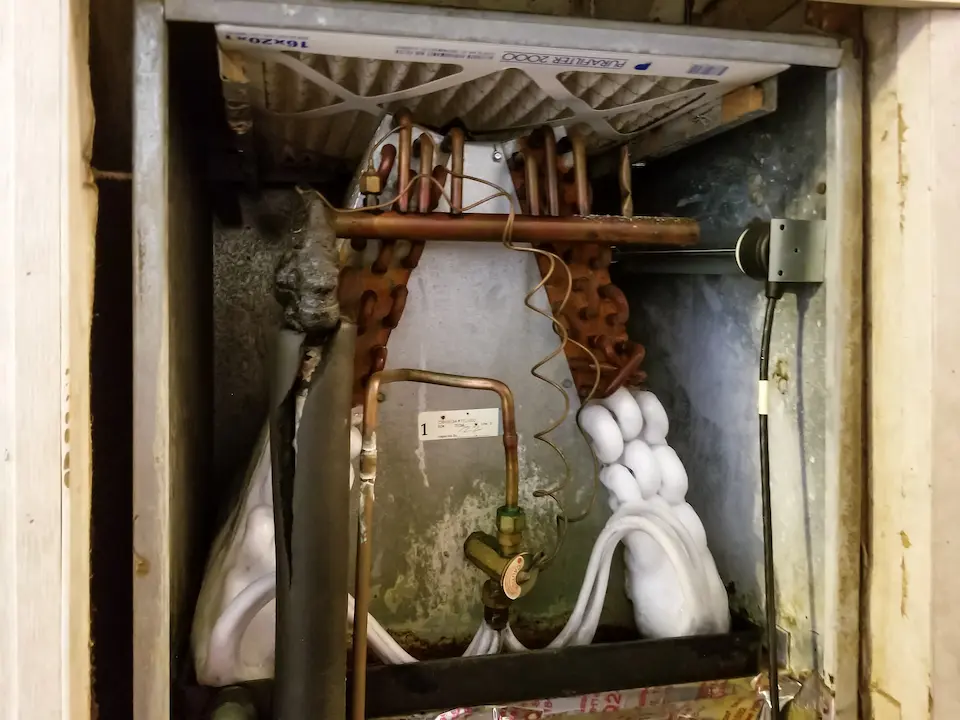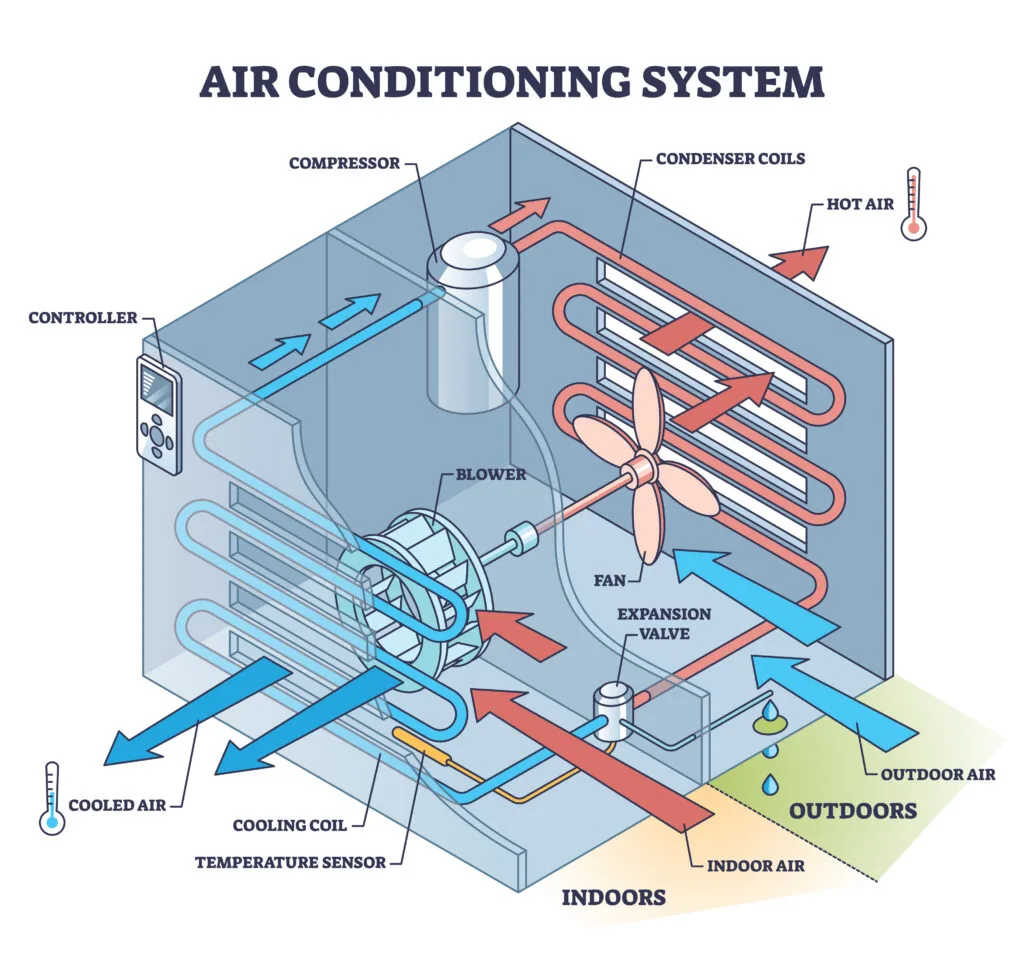April 20, 2023
How to Fix a Frozen AC Coil and Keep Your Home Cool All Summer Long

A frozen air conditioning coil can be a frustrating and potentially expensive issue for homeowners during the hot summer months. Not only can it cause your air conditioning system to stop working, but it can also lead to a range of other issues, such as reduced airflow and increased energy bills. However, with some basic knowledge and the right tools, fixing a frozen AC coil can be a relatively simple task.
Our AC repair professionals at Bowman Mechanical Services are here to help by offering some tips and tricks for fixing a frozen AC unit and keeping your home cool and comfortable all summer long.
What Causes a Frozen AC Coil?
Frozen evaporator coils can be caused by a variety of issues, including a lack of airflow to your air conditioning unit due to a dirty air filter, low refrigerant levels, issues with the blower fan or motor, and a blocked or dirty evaporator coil. By understanding these common causes, you can take steps to prevent your AC from freezing and keep your unit blowing cold air all summer long.

Lack of Airflow Due to a Dirty Air Filter
A dirty or clogged air filter can cause insufficient airflow over the evaporator coil in your HVAC system, which can cause the coil to freeze. A dirty filter can also cause your AC system to work harder than it needs to, leading to reduced energy efficiency and higher utility bills. In addition to preventing a frozen air conditioner, changing your AC filters regularly can also improve indoor air quality and extend the lifespan of your AC system.
Low Refrigerant Levels
The cold refrigerant is the substance that your AC system uses to cool the air that circulates through your home. If air conditioners have low refrigerant levels, this can cause the evaporator coil to freeze. Low refrigerant levels can be caused by leaks or other issues and should be addressed by an HVAC professional who specializes in cooling system repair.
Issues with the Blower Fan or Motor
The blower fan and motor are responsible for circulating the air over the evaporator coil and throughout your home. If these components are damaged or malfunctioning, it can cause inadequate airflow from the cooling system, which can in turn cause a frozen AC coil. Signs of issues with the blower fan or motor can include unusual noises, reduced airflow, or an AC unit that blows warm air.
Blocked or Dirty Evaporator Coil
Over time, the evaporator coil in your AC system can become blocked or coated with dirt, dust, and other debris. This can restrict airflow and cause the coil to freeze. During an AC system maintenance service, the technician can inspect and clean the evaporator coil, ensuring efficient and effective cooling in your home.
How to Fix a Frozen AC Coil?
Fixing a frozen air conditioning coil is a relatively simple task that can be completed by following a few basic steps. Let’s explore the steps to fix a frozen AC coil for your home.
STEP 1: Turn Off the AC Unit and Let the Ice Melt
The first step in fixing a frozen AC coil is to turn off the unit to allow the ice to melt. It’s important to give the coil time to thaw completely, as turning the system back on too soon can cause further damage. It’s recommended to wait at least 24 hours before turning the AC unit back on to ensure that the coil has thawed completely.
STEP 2: Replace the Air Filter
A dirty or clogged air filter can restrict airflow and cause the evaporator coil to freeze. After the ice has melted, it’s important to check the air filter and replace it if necessary. The frequency of air filter replacement varies depending on the manufacturer’s recommendations and usage, but it’s generally recommended to replace the air filter every 1-3 months.
STEP 3: Check and Add Refrigerant if Necessary
Low refrigerant levels can cause the evaporator coil to freeze. A professional HVAC technician can check the refrigerant levels and add more if necessary. If the system is low on refrigerant, it’s important to have a professional identify and repair any leaks to prevent future issues. Additionally, it’s important to note that adding too much refrigerant can also cause issues, so it’s best to leave this task to a professional.
STEP 4: Inspect and Repair the Blower Fan or Motor
Issues with the blower fan or motor can cause inadequate airflow, leading to a frozen AC coil. After the ice has melted, check the fan and motor for any damage or obstructions. If either component is damaged, it will need to be replaced. Additionally, it’s important to ensure that the blower fan is set to the proper speed and direction for optimal airflow.
STEP 5: Clean or Replace the Evaporator Coil
A blocked or dirty evaporator coil can cause the system to freeze. After the ice has melted, inspect the coil for any buildup or obstructions. The coil may need to be cleaned or replaced by a professional technician to ensure proper airflow and prevent future coil freezing.
Prevention Tips to Avoid a Frozen AC Coil
By following these prevention tips, you can help avoid a frozen AC coil and keep your AC system running smoothly all summer long.
Regularly Replace Air Filters
When your air filter is dirty or clogged, airflow is restricted. This can cause the evaporator coil to freeze. To prevent this from happening, it’s important to regularly replace air filters.
Schedule Routine Maintenance for the AC System
Regular preventative maintenance is essential to keeping your AC system running efficiently and effectively. A professional HVAC technician can identify and address any potential issues before they become major problems, helping to prevent a frozen AC coil. It’s recommended to schedule AC maintenance at least once a year, ideally in the spring before the start of the summer season.
Keep the Outdoor Unit Clear of Debris
The outdoor unit of your AC system can become clogged with leaves, grass, dirt, and other debris. This can restrict airflow and cause the evaporator coil to freeze. To prevent this, it’s important to regularly clean the outdoor unit and keep it clear of any obstructions.
Ensure Proper Insulation and Ventilation in the Home
Poor insulation or ventilation in the home can cause the AC system to work harder than necessary, leading to potential issues such as a frozen AC coil. To avoid this, ensure that your home is properly insulated and ventilated. This includes sealing any air leaks, adding insulation to the attic and walls, and ensuring proper ventilation in areas such as the attic and crawl space.
Frequently Asked Air Conditioner Coil Questions
Can I continue to run my AC if the coil is frozen?
It’s not recommended to continue running your AC if the coil is frozen. Doing so can cause damage to the system and potentially lead to more serious issues. Instead, turn off the AC and let the ice melt before attempting to troubleshoot and fix the problem.
How often should I replace my air filter?
The frequency of air filter replacement varies depending on the manufacturer’s recommendations and usage, but it’s generally recommended to replace the air filter every 1-3 months. However, homes with pets, smokers, or high levels of air pollution may require more frequent filter changes.
What happens if I don’t fix a frozen AC coil?
If a frozen AC coil is left unrepaired, it can cause damage to the compressor, which is a costly and time-consuming repair. In addition, a frozen coil can lead to reduced energy efficiency and increased wear and tear on the system, which can result in costly repairs and a shortened lifespan of the system.
How can I tell if my AC unit is low on refrigerant?
Signs that your AC unit may be low on refrigerant include reduced cooling power, increased energy bills, and ice buildup on the refrigerant lines or evaporator coil. If you suspect that your AC unit may be low on refrigerant, it’s important to contact a local cooling system repair company for assistance. They can check the refrigerant levels and complete any necessary repairs or maintenance to ensure that your AC system is running efficiently and effectively.
Don’t Let a Frozen AC Coil Leave You in the Cold – Schedule Your AC Maintenance Today!
Don’t let a frozen AC coil leave you in the cold this summer! Ensure that your AC system is running smoothly and efficiently by scheduling an AC maintenance appointment with our HVAC technicians at Bowman Mechanical today.
Contact us to inspect and maintain your system, including checking for potential issues that could lead to a frozen AC coil. With regular maintenance, you can avoid costly repairs and ensure that your home stays cool and comfortable all summer long.
Contact us today by calling [phone] or filling out the contact form below to get started.

